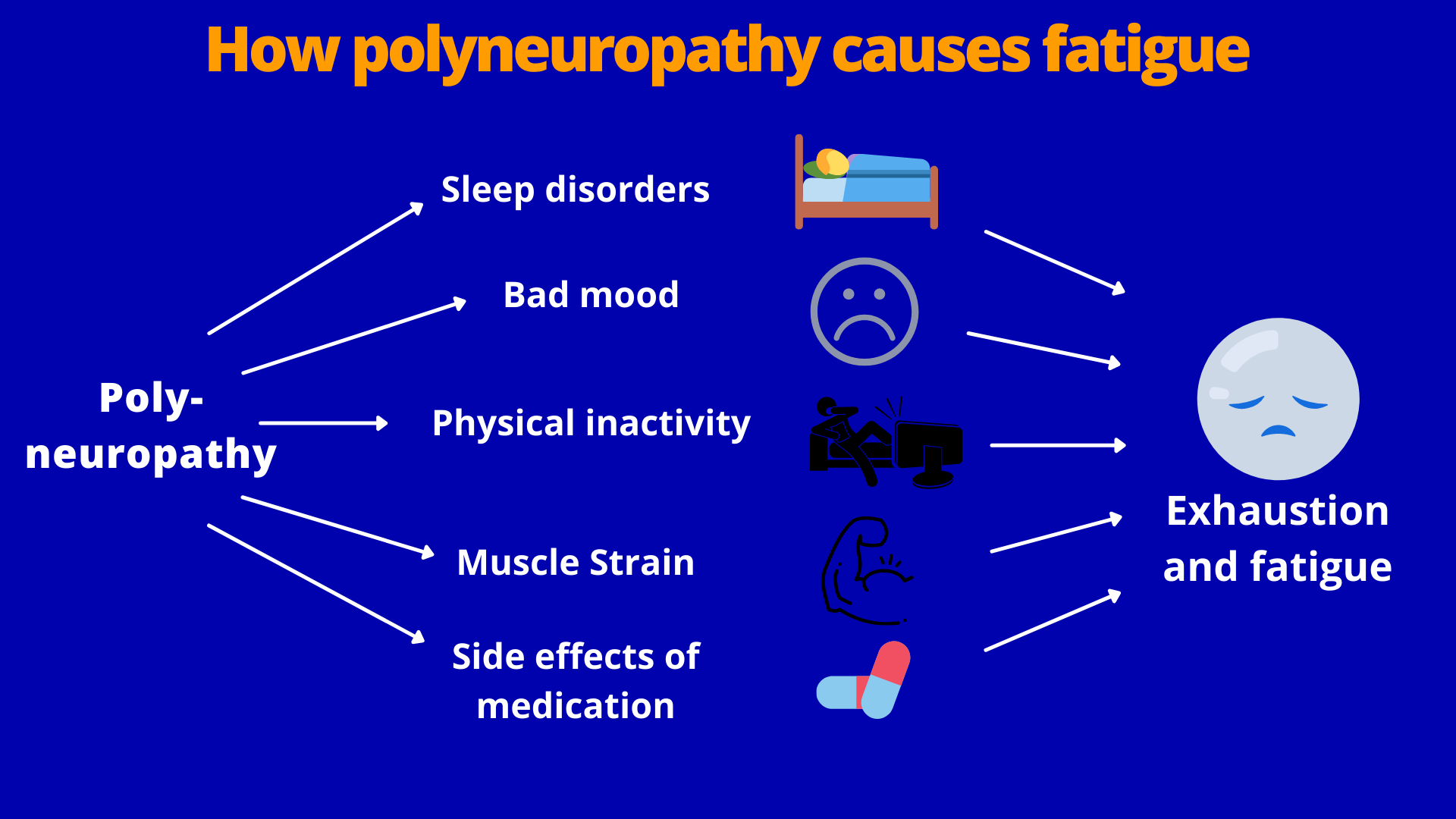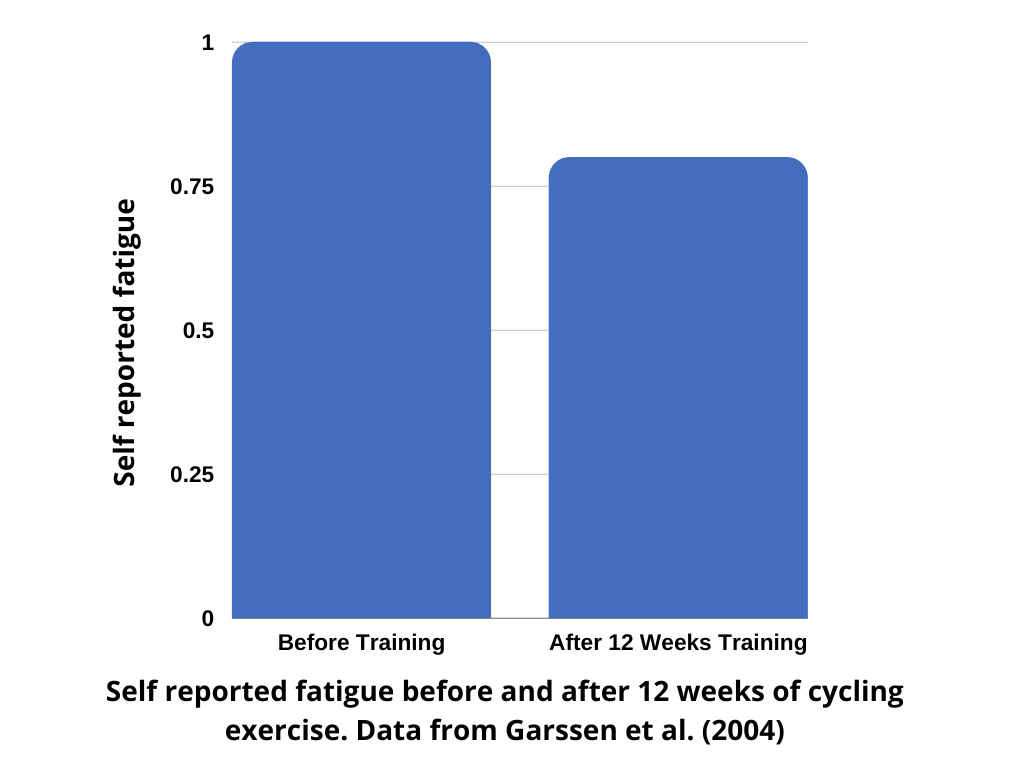Fatigue in polyneuropathy is very common but not commonly known
Very many people who suffer from polyneuropathy also suffer from exhaustion and fatigue. The fact that this is related to the disease is not known to many and is also rarely addressed. If you yourself suffer from fatigue due to polyneuropathy, you will certainly be interested in what causes it and what can be done about it.
I therefore summarized the results and recommendations for action of several scientific papers in this article.
The causes of fatigue in polyneuropathy summed up
There are multiple causes of fatigue in polyneuropathy. Often, several factors play a occur at the same time. The main reasons for exhaustion cited in scientific studies are:
- Sleeping problems
- Depression
- Muscular overload
- Physical inactivity
- Side effects of medication
You can read a recent study on this here: Lawley et al. (2020)

Various causes
With a condition as complex as polyneuropathy, there are no simple answers. The disease causes many different problems, which in turn can affect fatigue. Therefore, there is not one cause of fatigue and exhaustion in polyneuropathy, but many that interact. Different factors play a role in each patient and each requires different methods to improve the problem. However, there are some factors that are common and should be considered most of the time.
1. sleep problems
Since many patients have pain and discomfort due to polyneuropathy, they sleep poorly. In addition, the symptoms often intensify at night or are perceived more strongly. For example, one of my patients told me that she has been waking up at 4:30 every morning for years because her heels are starting to hurt. And this despite the fact that she has no pain in her heels during the day.
It is obvious that you do not sleep as good if you are in pain. Therefore, when suffering from exhaustion, it is especially important to get suitable painkillers. If symptoms are less severe during the day, it may be a good idea to take pain killers only right before bedtime.
I know there are many people with polyneuropathy for whom no pain medication works. In such cases, you can ask the doctor whether sleeping pills are useful.
Also, there are other methods that can reduce pain besides medication. You can find detailed instructions in the following article: Pain in polyneuropathy and what you can do about it. The patient with the heel pain I just told you about reported that by massaging the soles of her feet and calves, the pain in her heel was at least somewhat reduced.
2. low mood and depression
Those who suffer from polyneuropathy sometimes have good reasons to be sad. Your mental state is a factor that can greatly influence fatigue. Those who suffer from sadness or even depression often feel additionally exhausted. Pronounced day timefatigue is even a diagnostic criterion for depression. Therefore, when experiencing symptoms of exhaustion in polyneuropathy, you should also be careful not to fall into a depressed mood. Of course, this is easy to say because no one likes to be sad and everyone would like to feel better. To provide helpful information on self-help for depression, I spoke with Dr. Adrian Schweinoch, who is a psychiatrist at a psychiatric clinic in Neuss, Germany.
According to Dr. Schweinoch, one recommendation for everyday life is: "It is important not to withdraw too much, especially over a longer period of time! This can lead to a vicious cycle of depression, which means that your mood is negatively affected by being inactive and as a result you withdraw even more! The important thing is to stay active, even if it seems difficult at times!"
According to Dr. Schweinoch, contact with other people is particularly crucial:
3. overloaded muscles
Everyone knows that you feel exhausted after you have done hard physical work. What's not so obvious is that people with polyneuropathy often do heavy physical work all the time - often without realizing it.
When suffering from polyneuropathy, muscle strength often decreases because the damaged nerves can no longer activate all the muscle fibers as well as they used to. This results in the muscle fibers that are still functioning having to do more work. So overloading of these muscle fibers occurs more quickly. In addition, movement patterns change due to the disease. You can't walk as well and easily as you used to, so you start using compensatory movements that are often more demanding for certain parts of your body than previous movement patterns.
Therefore, when I examine the muscles of my patients, I very often find overloaded muscles. This is particularly noticeable in that the muscles are hardened and shortened, especially in the lower leg and feet. However, the patients themselves often do not notice this, because the perception of these body parts is reduced due to the polyneuropathy. However, the body is well aware of the constant overload and reports it in the form of exhaustion.
Therefore, those who have more muscle strength often suffer from less fatigue. A research group led by Andrew Lawley of Aston University in Birmingham and a research group led by Johannes Bussmann of the University Hospital Rotterdam also proved this connection statistically: in their studies, those who had more muscle strength also had fewer problems with fatigue.
You can read about the studies here: Lawley et al. (2020) Bussmann et al. (2007).
Firstly, to reduce muscle overload, it is important to actively relax the muscles. This can be done through massage and stretching. In addition, by training coordination, one can manage to make movement patterns more effortless again and thus reduce muscle overload. In addition, targeted strength training can strengthen muscles and make it easier for you to cope with everyday life without overloading.
Exercises for this, as well as instructions for massage and stretching for polyneuropathy, can be found here:
4. physical inactivity
Another factor that plays a significant role in fatigue, according to scientific studies, is physical activity. People who exercise to a healthy amount also have fewer symptoms of exhaustion. On the other hand, those who are inactive also suffer from more fatigue. This has been known in sports science for a long time. There was research decades ago showing that physical activity can improve chronic fatigue.
A study at the University Hospital of Rotterdam investigated whether fatigue would improve in patients with chronic inflammatory polyneuropathy if they took up an exercise program. For this purpose, 20 patients trained 3x45min per week for 12 weeks on bicycle ergometers. Before training began and at the end of the 12 weeks of training, they were asked about their symptoms of fatigue. After training, they reported 20% less fatigue. You can read the study from the journal Neurology here: Garssen et al. (2004)

Of course, it is not as easy for people with polyneuropathy to be physically active as it is for healthy people. Detailed information on training methods and which sports are recommended can be found here:
5. side effects of drugs
Medications used for the pain in polyneuropathy can often cause fatigue and drowsiness as a side effect. With pregabalin, which is widely used in polyneuropathy, up to 10% of patients report such symptoms.
In addition, drug interactions can also cause such symptoms. One of my patients reported severe problems with fatigue, drowsiness and dizziness. She also fell repeatedly and injured herself. During hospitalization after a fall, her medication dose was significantly reduced, and fatigue and dizziness disappeared.
With medications, especially painkillers, it is therefore important to find the right balance so that the negative side effects do not outweigh the benefits. This is not an easy decision and is different for each individual patient.
Is caffeine the solution to fatigue?
Many people tend to consume coffee or other caffeinated drinks when they are tired. This can help in the short term. However, you should not overdo it.
Some people who suffer from chronic fatigue consume a lot of caffeine. However, this can be quite counterproductive. Too much caffeine can increase fatigue in the long run, because the body gets used to the constant presence of the stimulant. As a result, you become even more tired at the times you are not on caffein. In addition, caffeine can further disrupt sleep.
For example, I had a patient with chronic fatigue and polyneuropathy who was consuming 7-10 cups of coffee a day. Such amounts make sleep more difficult and cause you to suffer even more from fatigue during the day.
There is nothing fundamentally wrong with coffee or caffeine consumption in polyneuropathy (Read more here: Polyneuropathy and coffee). However, one should be aware that caffeine only wakes you up for a short period of time and consumption should not be exaggerated if you suffer from chronic fatigue.
Several starting points
As you can see, there are a few starting points for doing something about fatigue and exhaustion. However, there is no one fits all remedy that works for all patients in the same way.
Still, it is important not to simply surrender to one's fate and accept the problems. As you can see, while there are some ways to help yourself, you should still consult your doctor about your fatigue and exhaustion.
Bitzer Sporttherapie
M.A. Sports Science
B.A. Sports Therapy
Owner of Bitzer Sporttherapie
Phone: +49 176 66 86 91 51
Email: Bitzer.Sporttherapie@gmail.com
